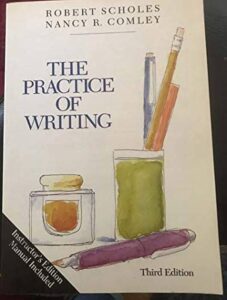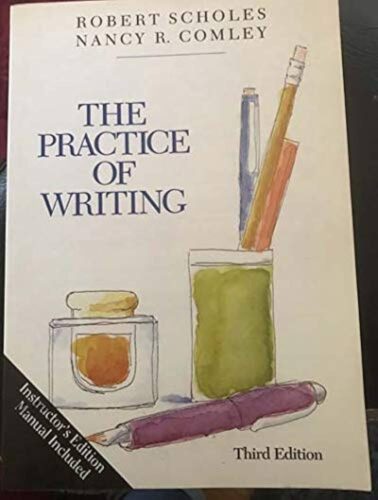Rethink your assignments
My first composition textbook as a new graduate teaching assistant was state-of-the-art—and a significant mismatch for the way I wanted to teach.
That was the first and last time I used a syllabus that followed a textbook’s path for designing a writing course: Chapter 1 leads to Essay 1, Chapter 2 leads to Essay 2, etc.

As someone who has re-organized, supplemented, co-created, cross-fertilized, publicly contradicted, and even abandoned textbooks for my writing classes across more than three decades, I couldn’t bring myself to write a textbook that tried to tell someone else exactly how to structure their students’ learning.
If you came here looking for The Answer about How This Book Should Be Used, I apologize: I do not have that answer. There are many very fine textbooks out there for you to choose from if you need that immediate congruency.
I do have some strong beliefs about the benefits, even the necessity, of directly instructed, theoretically grounded reflective practice to support writers and writing learners. But I’ve spent a long time as a faculty educator advocating for small, sustainable changes to improve teaching, so I also designed RYW to be usable for the course you have now, whatever that course is.
These first three sample syllabi are a down payment on that pledge. I hope you can use them to imagine how some part of RYW, or some collection of chapters or modules, can help you address your students’ challenges and goals as they gain the writing proficiencies that they most want and need.
Sample Syllabus 1: Purposes
First-year writing syllabus: Sequenced purposes/genres course, Moderate intensity reflection
Syllabus 1 outlines a typical purposes-based course. Students complete four major projects:
- Literacy narrative
- Three-source synthesis
- Researched argument (new topic or expanding on synthesis topic)
- Genre remix: Researched-argument project (or sub-issue thereof) transformed to a new genre
In addition, students work through a sequence of directed reflective practice: they begin with a typical “post-script” reflection for the first project, and expand their reflective practice in subsequent projects to include a mid-point problem-solving reflection and a project-prediction reflection, all helping them prepare for an “author statement” as part of the genre-recast project.
RYW is designed to support many kinds of purpose-based assignments that could find a home in this sequence: description/instruction, rhetorical analysis or topic-based analysis, evaluation or review, proposal, or argument without secondary sources.
Sample Syllabus 2: Reflections
First-year writing syllabus: Sequenced purposes/genres course, High intensity reflection
Syllabus 2 outlines how a purposes-based course can build in a stronger reflective component, culminating in a Theory of Writing assignment. Students complete four major projects and a brief remix proposal:
- Campus guidebook article
- Rhetorical analysis
- Researched argument
- Genre remix proposal
- Theory of writing
To make this kind of course structure function, I recommend a significant shift increase in the time weight and grade weight given to the first four projects. In the sample, the four “traditional” projects add up to just 50% of the final grade, and they might be more streamlined than usual—shorter projects, more tightly curated topics, and/or fewer external sources. These projects are designed to reflect authentic writing contexts, and yet serve as the occasion for improved reflective practice at least as much as, if not more than, being primary evidence of student mastery of “writing.”
Meanwhile, students’ weekly reflections (and peer reviews) gain grade weight (25%) and should gain an equivalent foothold in the course’s timeline: more instructional time, more practice time, more feedback. The theory of writing assignment gains the final 25%, as well as additional time on the course docket.
I’ll write more about this in an upcoming blog post, but it can take some mental gymnastics as an instructor to adapt to this shift. Students’ “final products” are likely to be less substantive or polished than in previous semesters, as instructors scale back the time and space for them and as students discover that they can still achieve the final grade they prefer without going the final mile on the traditional projects. In the last few weeks of a semester like this one, I often have to talk myself down from anxiety, reminding myself that students are performing strongly at what I most value: the transferable knowledge of how writers work.
Sample Syllabus 3: Inquiries
First-year writing syllabus: Research-project focused course, Moderate intensity reflection
Syllabus 3 outlines a course in which students write in steps toward a single research-supported project. The project could be related to a personal interest or course theme, to a community- or site-based project, or to an academic discipline.
Students complete four major projects related to a single area of inquiry, moving from exploring their own relevant personal experiences to analysis of perspectives from secondary sources to a final argument project.
- Investigate an experience
- Analysis: Three sides of the issue
- Annotated bibliography
- Researched argument
In addition, students work through a sequence of directed reflective practice: they begin with a typical “post-script” reflection for the first project, and expand their reflective practice in subsequent projects to include a mid-point problem-solving reflection and a project-prediction reflection.
RYW is designed around an assumption that all writers research and that all writing benefits from deliberate inquiry. Writing about a personal experience involves the same principles of inquiry that underlie a writer’s work on an annotated bibliography of published sources. Memoir writers, for instance, blend personal memory with others’ reports (such as family members’ memories or friends’ social media accounts) and secondary sources (newspapers, guidebooks, local records). So RYW provides support for writers’ self-based research and people-based research as well as published source-based research.
And because college writers are often surprised to be asked to “go look for information” at more than one point in their project work, chapters in RYW identify three separate stages of inquiry: exploring complex issues and research questions through initial source review (sometimes people call this “pre-search”); locating and evaluating answers to specific questions; and addressing gaps or complications that arise as a writer more fully understands their issue, their goals, and/or their readers’ needs.
